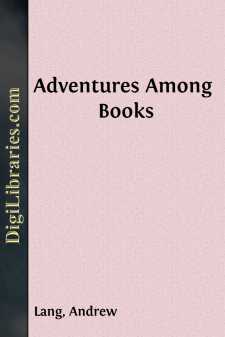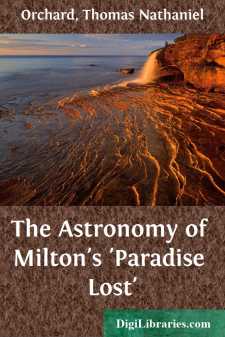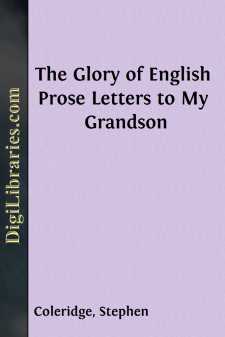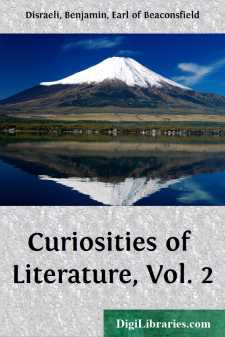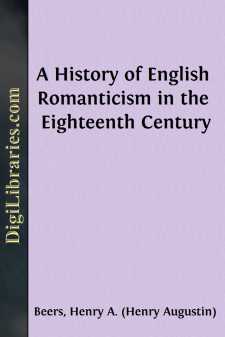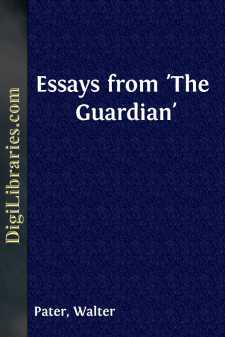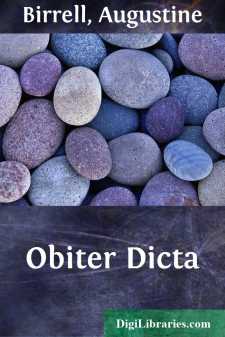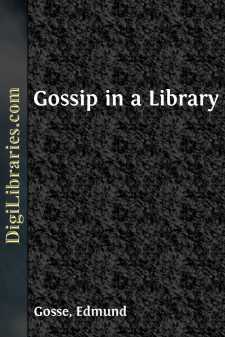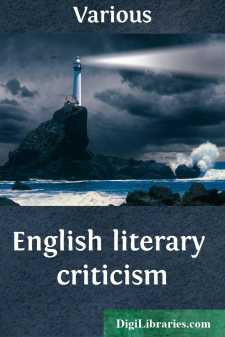Literary Criticism
- American 18
- Ancient and Classical 3
- Asian 1
- Australian & Oceanian 1
- Books & Reading 8
- Caribbean & Latin American 2
- Drama 2
- English, Irish, Scottish, Welsh
- European 7
- General 37
- Horror 1
- Humor 2
- Jewish 2
- Medieval 2
- Middle Eastern 3
- Poetry 7
- Renaissance 6
- Russian & Former Soviet Union 1
- Shakespeare 27
English, Irish, Scottish, Welsh Books
Sort by:
by:
Andrew Lang
CHAPTER I: ADVENTURES AMONG BOOKS I In an age of reminiscences, is there room for the confessions of a veteran, who remembers a great deal about books and very little about people? I have often wondered that a Biographia Literaria has so seldom been attempted—a biography or autobiography of a man in his relations with other minds. Coleridge, to be sure, gave this name to a work of his, but he...
more...
CHAPTER I A SHORT HISTORICAL SKETCH OF ASTRONOMY Astronomy is the oldest and most sublime of all the sciences. To a contemplative observer of the heavens, the number and brilliancy of the stars, the lustre of the planets, the silvery aspect of the Moon, with her ever-changing phases, together with the order, the harmony, and unison pervading them all, create in his mind thoughts of wonder and...
more...
1 My Dear Antony,The letters which I wrote "On the world about you" having shown you that throughout all the universe, from the blazing orbs in infinite space to the tiny muscles of an insect's wing, perfect design is everywhere manifest, I hope and trust that you will never believe that so magnificent a process and order can be without a Mind of which it is the visible expression. The...
more...
CHARLES THE FIRST. Of his romantic excursion into Spain for the Infanta, many curious particulars are scattered amongst foreign writers, which display the superstitious prejudices which prevailed on this occasion, and, perhaps, develope the mysterious politics of the courts of Spain and Rome. Cardinal Gaetano, who had long been nuncio in Spain, observes, that the people, accustomed to revere the...
more...
CHAPTER I. The Subject Defined To attempt at the outset a rigid definition of the word romanticism would be to anticipate the substance of this volume. To furnish an answer to the question—What is, or was, romanticism? or, at least, What is, or was English romanticism?—is one of my main purposes herein, and the reader will be invited to examine a good many literary documents, and to do a certain...
more...
by:
Walter Pater
[3] THE making of an anthology of English prose is what must have occurred to many of its students, by way of pleasure to themselves, or of profit to other persons. Such an anthology, the compass and variety of our prose literature being considered, might well follow exclusively some special line of interest in it; exhibiting, for instance, what is so obviously striking, its imaginative power, or its...
more...
by:
Voltaire
INTRODUCTION François Marie Arouet, who called himself Voltaire, was the son of François Arouet of Poitou, who lived in Paris, had given up his office of notary two years before the birth of this his third son, and obtained some years afterwards a treasurer’s office in the Chambre des Comptes. Voltaire was born in the year 1694. He lived until within ten or eleven years of the outbreak of the...
more...
CARLYLE The accomplishments of our race have of late become so varied, that it is often no easy task to assign him whom we would judge to his proper station among men; and yet, until this has been done, the guns of our criticism cannot be accurately levelled, and as a consequence the greater part of our fire must remain futile. He, for example, who would essay to take account of Mr. Gladstone, must...
more...
by:
Edmund Gosse
CAMDEN'S "BRITANNIA" BRITAIN: or a chorographical description of the most flourishingKingdomes, England, Scotland and Ireland, and the Ilands adioyning;out of the depth of Antiquitie: beautified with Mappes of the severallShires of England; Written first in Latine by William Camden,Clarenceux K. of A. Translated newly into English by Philémon Holland.Londini, Impensis Georgii Bishop &...
more...
by:
Various
INTRODUCTION. In England, as elsewhere, criticism was a late birth of the literary spirit. English poets had sung and literary prose been written for centuries before it struck men to ask themselves, What is the secret of the power that these things have on our mind, and by what principles are they to be judged? And it could hardly have been otherwise. Criticism is a self-conscious art, and could not...
more...


